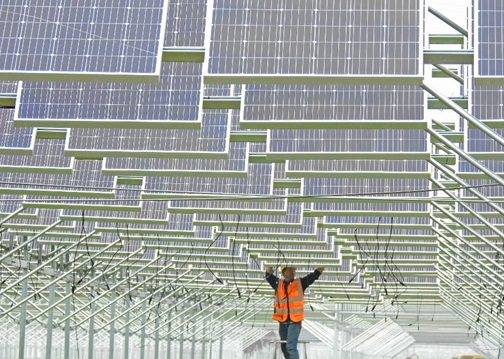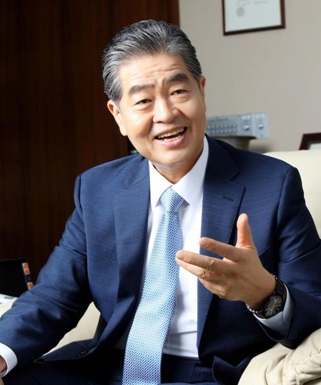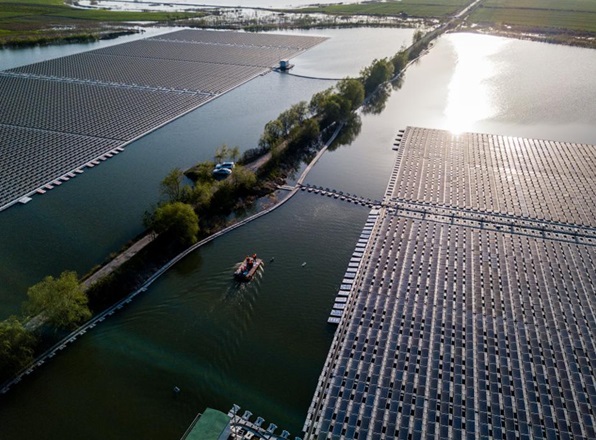- Daesung News
- Read the latest news featuring Daesung Group
| Title | [Forbes] World Energy Council Chairman Encourages Industry To Embrace New, Green Tech | 2018.05.18 |
|---|---|---|
|
FROM: Forbes [Forbes - May. 18, 2018]
World Energy Council Chairman Encourages Industry To Embrace New, Green Tech
A worker installs solar panels at a solar power plant on May 15, 2018 in Lianyungang, China. (VCG/VCG via Getty Images)
The next gathering of the World Energy Congress is still over a year away, but you would never guess that by observing the sense of urgency surrounding World Energy Council Chairman Younghoon David Kim’s preparations or the passion with which he speaks on the need to move the energy industry forward. Some readers may not be familiar with the WEC, but the organization’s enormous influence over perhaps the world’s most important commodities ensures that what happens at the World Energy Congress shapes every aspect of the global economy.
A changing industry
In addition to serving as the Chairman of the WEC, Kim is CEO of Korea’s Daesung Group, ensuring that nearly every waking moment is dedicated to solving the myriad looming crises that may threaten the energy market.
Daesung Group
Ever the optimist, Kim sees opportunity within these challenges. He aims to use the 2019 gathering of the WEC as a platform to advance the industry in a way that will help it respond to the accelerating pace of change in a market sector that is placing a growing priority on disruption and innovation.
Still, Kim more than has his work cut out for him as he continues to push the famously conservative industry away from overreliance on fossil fuels and towards renewables. This preference for green initiatives calls for a more enthusiastic embrace of creative thinking. Kim believes that in the near future, we will see energy markets driven not primarily by resources or capital, but instead centered on brainpower and technology. According to Kim, “Now, the energy industry is moving from a capital-intensive industry to a knowledge-based industry.” The agenda for next year’s World Energy Congress in Abu Dhabi reflects Kim’s philosophy, with the WEC devoting a full day (out of four total) to a deeper look at future technologies and how they will be financed.
New thinking
Mr. Kim believes it is time for the development of “outside-the-box” technologies and is a noted early backer of microbial energy, investing Daesung resources in R&D resources in this emerging field. In addition to hosting a global forum on the potential of this technology later this year, his company already operates a facility in Daegu, South Korea which harnesses microbes to turn waste into natural gas. He has, “A great deal of hope in the future of microbial energy.
Technologies like microbial fuel cells and microbial electrolysis could spark a paradigm shift from our dependence on the dead – fossil fuels – towards a partnership with living organisms.”
The push for new energy sources comes at a time when skyrocketing demand seems to clash with growing concern over the long-term viability of traditional energy resources. Kim draws parallels to the projected shortages in key commodities such as food and water that must be addressed by the next generation of leaders. “Food, energy and water are all under threat due to climate change, and these issues must be viewed as interdependent. If there is a problem with energy, it naturally affects food and water. Thus, responsible energy resource development must also be able to provide solutions that address food and water.”
Asia is key
Unsurprisingly, the importance of new technologies and responsible environmental stewardship will be key areas of focus at the 2019 World Energy Congress. However, Kim and other reformers maintain that the most pressing short-term need for the industry is to address the emergence of Asia as the largest bloc of energy consumers. Meeting this rising demand will require a rethinking of infrastructure and current logistics planning among global energy suppliers.
Aerial view of the floating solar power station on top of an abandoned coal mine at Nanping Village in Huaibei, Anhui Province of China. (VCG/VCG via Getty Images)
As the first Korean and only the second Asian to head the WEC, Kim is in position to help the body steer members in the right direction and toward success in increasingly prominent Asian markets. Contrary to popular claims that the U.S. and Europe are the only markets that value clean energy, Kim says that, “While Asia might not be a perfect green ‘role model’ just yet, Asians are providing the world with some of the best examples of how to promote sustainable energy. For example, as a region Asia has been aggressively developing its renewable energy sector.” Kim backs up this claim by pointing out that eight of the top ten solar cell producers in 2016 hailed from Korea, China and Taiwan.
The future of energy
So, what does his wholehearted embrace of futuristic green technology say about the direction of the WEC? Kim believes that the organization’s primary role must be in determining where the industry heads over the coming decades and identifying the future leaders capable of unleashing the next wave of innovation. Put more succinctly, Kim aims to equip the WEC to “seek out and support the future Michael Faradays in our midst.”
(Omissions)
As the industry continues to evolve, Kim hopes to use his influence as Chairman of the WEC to help the most promising minds find the resources they need to make a lasting impact. The World Energy Council is uniquely positioned for this role, bridging the divide between what Kim calls, “The thinkers and the doers.” As the Next World Energy Congress draws nearer, it will be interesting to see what these innovators have in store.
POST WRITTEN BY Merrick Laravea
|
||
| NO | Title | Date |
|---|---|---|
| 247 | [Asia Times] Could a pipeline of pe... | 2018.08.12 |
| 246 | [Forbes] World Energy Council Chair... | 2018.05.18 |
| 245 | [The Korea Herald] Daesung chairman... | 2017.10.17 |
| 244 | [Korea Joongang Daily] Microbes are... | 2017.06.19 |
| 243 | World Energy Council Chair addresse... | 2017.04.29 |








